


Most teens use some form of social media and have a profile on a social networking site. Many visit these sites every day.
There are plenty of good things about social media – but also many risks and things kids and teens should avoid. They don’t always make good choices when they post something to a site, and this can lead to problems.
So it’s important to talk with your kids about how to use social media wisely.
Social media can help kids:
The flipside is that social media can be a hub for things like cyberbullying and questionable activities. Without meaning to, kids can share more online than they should.
Most teens:
This can make them easy targets for online predators and others who might mean them harm.
In fact, many teens say they have:
Besides problems like cyberbullying and online predators, kids also can face the possibility of a physical encounter with the wrong person. Many apps automatically reveal the poster’s location when they’re used. This can tell anyone exactly where to find the person using the app.
And photos, videos, and comments made online usually can’t be taken back once they’re posted. Even when a teen thinks something has been deleted, it can be impossible to completely erase it from the Internet.
Posting an inappropriate photo can damage a reputation and cause problems years later – such as when a potential employer or college admissions officer does a background check. And sending a mean-spirited text, even as a joke, can be very hurtful to someone else and even taken as a threat.
Spending too much time on social media can be a downer too. Seeing how many “friends” others have and the pictures of them having fun can make kids feel bad about themselves or like they don’t measure up to their peers.
It’s important to be aware of what your kids do online. But snooping can alienate them and damage the trust you’ve built together. The key is to stay involved in a way that makes your kids understand that you respect their privacy but want to make sure they’re safe.
Tell your kids that it’s important to:
Make a Contract
Consider making a “social media agreement” with your kids – a real contract they can sign. In it, they agree to protect their own privacy, consider their reputation, and not give out personal information. They also promise not to use technology to hurt anyone else through bullying or gossip.
In turn, parents agree to respect teens’ privacy while making an effort to be part of the social media world. This means you can “friend” and observe them, but don’t post embarrassing comments or rants about messy rooms.
Parents also can help keep kids grounded in the real world by putting limits on media use. Keep computers in public areas in the house, avoid laptops and smartphones in bedrooms, and set some rules on the use of technology (such as no devices at the dinner table).
And don’t forget: Setting a good example through your own virtual behaviour can go a long way toward helping your kids use social media safely.
Source: ‘Teaching Kids to Be Smart About Social Media’ – www.kidsorg.co.za
Dear parents & guardians,
𝗥𝗘: 𝗦𝗰𝗵𝗼𝗼𝗹 𝗔𝗿𝗿𝗮𝗻𝗴𝗲𝗺𝗲𝗻𝘁𝘀 𝗧𝗲𝗿𝗺 𝟯 𝟮𝟬𝟮𝟭
We look forward to receiving your children at the beginning of the third term of the year.
We trust that you are all remaining safe and resolute during the difficult time that we are currently experiencing.
The following procedures will be observed in the re-opening of our school for the third term:
• Union High School will reopen on 26 July 2021 for all grades utilizing the daily rotational timetable model.
• Our Grades 5-9 learners will continue with the weekly rotation timetable model commencing on 26 July 2021. GROUP A will attend school on Monday, 26 July.
• The Grade 5-7 learners will then return to the traditional daily attendance timetable model on 2 August 2021.
• This means that Grades 8-9 will continue with the daily rotational timetable until further notice.
• Grades 10-12 will attend school daily.
All COVID-19 protocols must be observed, and we appeal to parents and guardians not to send learners to school who may be exhibiting symptoms, or who are direct contacts of people who are symptomatic or ill.
Yours faithfully,
MR. W.E. PRINGLE
𝗛𝗘𝗔𝗗𝗠𝗔𝗦𝗧𝗘𝗥
𝘜𝘯𝘪𝘰𝘯 𝘏𝘪𝘨𝘩 𝘚𝘤𝘩𝘰𝘰𝘭

It is with profound distress and sorrow, that the Union Schools extends its condolences to the family and friends of the late Karin Marais.
Dear Parents/Guardians,
We have survived another school term, one that was certainly challenging and demanding on our learners and staff.
We thank you for your continued support during these very difficult times and trust that you will all stay safe over the school holiday.
STAFF MATTERS
We say farewell to Mr Erwin Ittershagen-Strauss and Ms Hanel Weidemann at the end of this term and wish them well in their new posts in Port Elizabeth and Uitenhage, respectively.
IMPORTANT DATES FOR TERM 3
CLOTHING SHOP
The School Clothing Shop, which is housed at the high school for parents’ and learners’ convenience, will operate from Monday to Friday from 08.00 to 13.00 when school reopens on Monday, 19 July.
May you enjoy a restful holiday with your children.
Yours faithfully
MR W.E. PRINGLE
HEADMASTER | Union High School